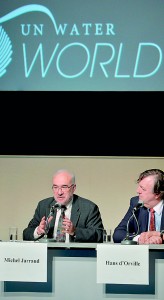News
UN warns water energy needs coming to crunch- point
With the United Nations predicting that the world will need 40 per cent more water and 50 per cent more energy some 15 years from now, World Water Day’s theme of “Water and Energy” Friday was right on target, very much so for Sri Lanka.
Sri Lanka is hoping to increase its reliance on hydro-power but is facing problems with drought and contesting claims on water resources by farmers and others.

Michel Jarraud (L), secretary-general of the World Meteorological Organisation and UNESCO assistant director-general Hans D'orville (R) attend a panel discussion at the "The Water-Energy Nexus" conference at the United Nations University in Tokyo on March 21 on the eve of World Water Day. AFP
Tokyo yesterday hosted the main international events commemorating this year’s World Water Day, centerpiece of which was a flagship UN report, the 2014 World Water Development Report (WWDR).
Considered an authoritative status report on global freshwater resources, it highlights the need of policies and regulatory frameworks that integrate approaches to water and energy priorities.
Water and energy are closely interconnected and highly interdependent, the UN report says.
Choices made and actions taken in one domain can greatly affect the other, positively or negatively. Trade-offs need to be managed to limit negative impacts and foster opportunities for synergy. Water and energy have crucial impacts on poverty alleviation.
The UN predicts that by 2030 the world’s population will need 35 per cent more food, 40 per cent more water and half again as much energy as it consumes today.
In stark contrast to these projected requirements, already 768 million people lack access to improved water sources, 2.5 billion people lack proper sanitation and 1.3bn people cannot access electricity. These issues need urgent attention, the report released yesterday says.
There is increased stress on the supplies of groundwater, the report says. In many countries, aquifers are reaching their limits.
Energy currently accounts for 15 per cent of freshwater withdrawals and this is set to rise by 20-25 per cent by 2035.


